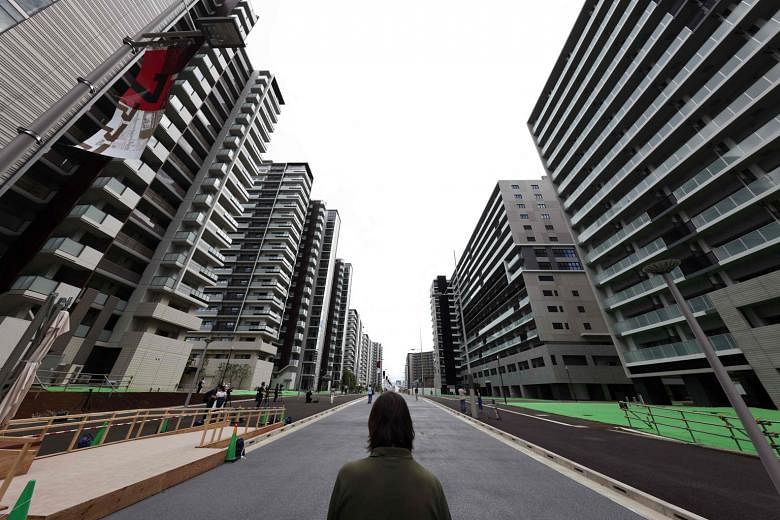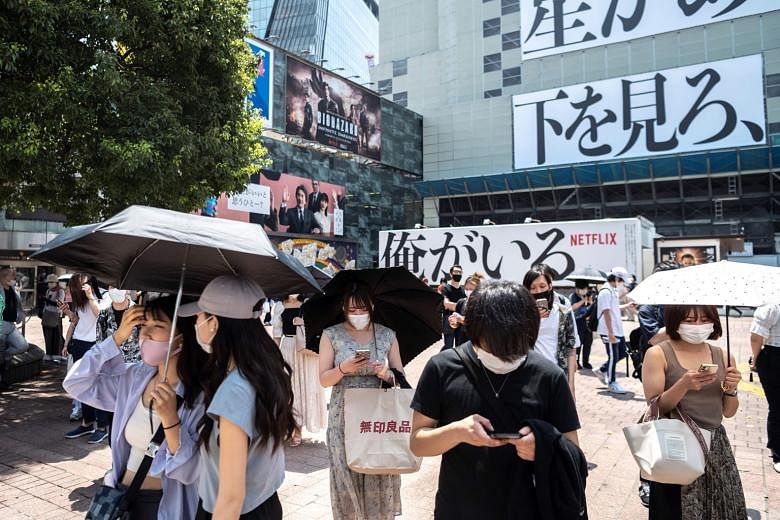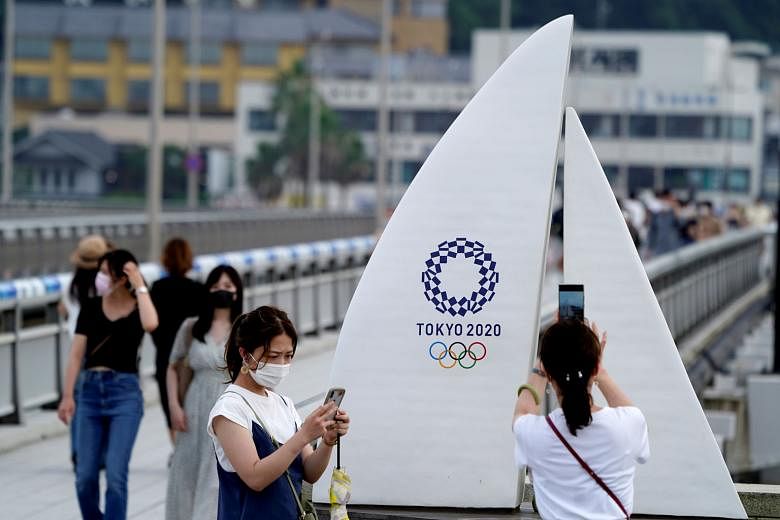One person has tested positive for Covid-19 at the athletes' village for the Tokyo Olympics, raising doubts over a "safe and secure" Games pitched as a symbol of global unity and the proverbial hopeful light at the end of the tunnel of the pandemic.
Officials confirmed yesterday that a visitor from abroad involved in organising the Games tested positive during a routine test last Friday. The person's nationality was not revealed, owing to privacy concerns.
There have been at least 45 Covid-19 cases tied to the Games. But this is the first time one has been detected in the athletes' village, where most of the competitors are staying for the duration of the Olympics, which kick off on Friday.
There is very little fanfare in Tokyo after organisers barred spectators from attending the Games. Fringe events have been all but cancelled.
A sizeable proportion of Japanese residents are against the Games, and a petition with more than 450,000 signatures was submitted to Tokyo Governor Yuriko Koike last week.
Globally, there is no end in sight as Covid-19 rages on, driven by more contagious and dangerous variant strains.
This was definitely not what then Prime Minister Shinzo Abe had in mind when he came to an agreement with the International Olympic Committee (IOC) in March last year to postpone the Tokyo 2020 Olympic and Paralympic Games by a year.
They said the delay was necessary so that the Games could take place "in a complete form", which was defined as "a safe tournament (where) international athletes play in top condition and spectators can attend with peace of mind".
Now, some international athletes, such as British weightlifter Sarah Davies, have found themselves in a predicament.
She posted a video on Instagram and, in a mocking tone, as she walked on a stretch of pavement, said: "We have what we call the prison yard. We can literally walk up and down this stretch between the hours of 7am and 10am, and that is the only time we're allowed outside."
She added: "Generally, feels like we're in prison. Welcome to Olympic Games, Covid-19 edition."
The Games are occurring as Covid-19 cases are on the rebound in Tokyo, which clocked four straight days of more than 1,000 infections yesterday, the highest figures since January.
The rise in cases set Twitter abuzz, with users mocking the Games and saying that Tokyo should "aspire" towards reaching 2,020 cases on Friday - when the Games open - for posterity.
Already struggling to cope with Covid-19 cases, medical doctors now have to deal with victims of the brutal summer heat. Hundreds of people in Tokyo were taken to hospital last week with heatstroke.
Yet, Mr Abe said in a recent interview with a weekly tabloid that those who opposed the Games were "anti-Japan".
If the plan was to stoke nationalist fervour, it did not register with a jaded Tokyo public. The ruling Liberal Democratic Party (LDP) suffered a shock upset in local assembly polls earlier this month.
Prime Minister Yoshihide Suga, meanwhile, has seen his Cabinet approval ratings plunge to dangerous depths, with a general election just around the corner - it must be called within three months. The latest survey by Jiji Press, released last Friday, showed support for the government at just 29.3 per cent, the lowest since 2017.
To be fair, the seemingly haphazard organisation of the Olympics is just one of many things the public has been unhappy about, with Tokyo's fourth state of emergency having begun a mere three weeks after the third was lifted.
There is a prevailing sense that the Olympics are being held at all costs and given "special treatment". This is despite live gigs, fireworks festivals and other traditional cultural events being scrapped, along with the coming-of-age day and graduation ceremonies that are milestones in the lives of any Japanese.
"I think the government, IOC and Tokyo Metropolitan Government need to properly explain why the Games should have priority over other cancelled events," Ms Saori Asano, 27, who works in public relations, told The Sunday Times.
While she had tickets to the men's football final, she stresses that she "neither agrees nor disagrees" that the Games should go ahead, but feels that everyday concerns are not being adequately heard or addressed.
Lead vocalist Yojiro Noda, 36, of rock band Radwimps, known for the theme song of anime Your Name (2016), was uncharacteristically frank when he wrote in a widely shared post on Twitter: "It makes me sick. Domestic events and industries are being asked to sacrifice, when experts have been clear that the Games will pose a risk whether with spectators or not."
He added: "I am not against the Olympics, but not when other events must be cancelled despite taking measures."
He also said: "Not one single person has explained why this must be so. It is irresponsible and wrong to rob our youth of their once-in-a-lifetime events like coming-of-age days and school trips."
IOC president Thomas Bach - who is now in Japan - has become another lightning rod.
He stoked fury when he referred to the Japanese as "Chinese people", and also when he claimed that the Games posed "zero Covid-19 risk" to the public.
Domestic media immediately pounced, with reports that the so-called "bubble" to segregate visitors for the Games from the public had already burst.
The oversight is so relaxed that overseas media have reportedly been conducting interviews in public areas without permission, while members of official delegations have made unapproved visits to convenience stores and other shops outside the bubble.
A hotel manager in Tokyo told the Asahi Shimbun that Olympic-related guests have been coming and going, but it was impossible to track everybody's movements, and it was not supposed to be "even our job to begin with".
Mr Bach dismissed these concerns, saying he heard no report of any violations that could endanger the Japanese people.
In the light of all this, the public have taken potshots at Mr Bach's request to Mr Suga to allow spectators "should the situation improve", although the spectator ban has been strongly recommended by health experts.
Mr Bach's one-day trip to Hiroshima last Friday was met with protests and a petition with more than 70,000 signatures claiming that he was using the visit for political purposes.
Mr Toshiyuki Mimaki, a 79-year-old atomic bomb survivor, told the Nikkei newspaper he felt uncomfortable that an official visit could be made while Tokyo was in the midst of an emergency.
It is against this backdrop that organisers hope inspirational sporting feats will be uplifting for a country - and a world - in distress.
Among the high-profile Japanese athletes expected at the Games are people who have overcome personal adversity.
Tennis Grand Slam winner Naomi Osaka, in her Olympic debut, has openly struggled with mental health issues and depression.
Leukaemia survivor Rikako Ikee is making her return to the pool, while badminton world No. 1 Kento Momota was briefly out of action after a car accident.
Japanese Olympic Committee president Yasuhiro Yamashita noted that the country had aimed for a record 30 gold medals before the pandemic struck.
However, medals were no longer on his mind, he told a recent news conference.
"What I regard as a success is that people struggling in many countries due to the pandemic feel empowered by the performance and achievements of their own countries' athletes."



